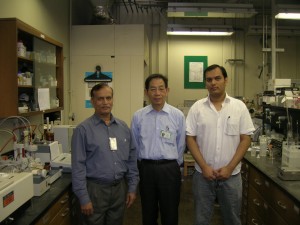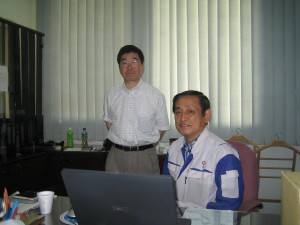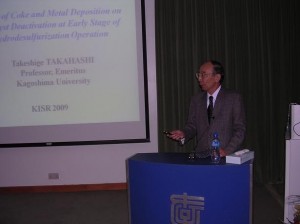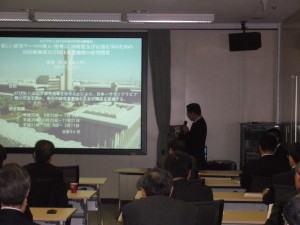Progress Report on "The Long-term Researcher Dispatch Program"
1. Program Objective
JCCP launched "The Long-term Researcher Dispatch Program" in FY2007 as a new initiative under the International Joint Research Scheme. Through the program, JCCP sends honorary university professors and senior corporate researchers to universities and research institutions in major oilproducing countries long term, to provide guidance to local researchers and to promote the advancement and invigoration of research activities in counterpart organizations by helping them improve research methods and address new research themes. The program also aims to enhance personal exchanges in the research field and thereby build and strengthen relationships of trust between oil-producing countries and Japan.
2. Implementation Status
In FY2007, the year of commencement of the program, the months between May and October were busily spent making the necessary preparations, and researchers were actually dispatched overseas in November. Two researchers were respectively dispatched to King Fahd University of Petroleum and Minerals (KFUPM) in Saudi Arabia and Kuwait Institute for Scientific Research (KISR) in Kuwait for a period of three months, from November to February. The two organizations were selected as counterpart organizations of the program, as they have built a solid relationship with JCCP in the technical cooperation field going back more than 15 years, through the joint implementation of international research programs, technical cooperation projects, and periodical symposiums. In FY2008, three researchers were dispatched to KFUPM and KISR as before. An overview of the first two years of the program is presented below.
Dispatch to KFUPM
- Researcher
Dr. Hideshi Hattori, Professor Emeritus, Hokkaido University - Term
Three-month dispatch to KFUPM, between November 2007 and February 2008
Three-month dispatch to KFUPM, between June 2008 and February 2009 - Field of research assistance
Introduction and guidance in new themes in catalyst research
(1)Production of clean gasoline composed primarily of multi-branch alkane through the use of
zirconium solid acid catalysts and elucidation of the catalyst action mechanism
(2)Production of high added-value aromatics through the use of solid base catalysts and
elucidation of the catalyst action mechanism
Dispatch to KISR
- Researcher
Dr. Hidehiro Higashi, JGC Catalysts and Chemicals Ltd. - Term
3-month dispatch to KISR, between November 2007 and February 2008
3-month dispatch to KISR, between May 2008 and November 2008 - Field of research assistance
Studies on improving catalyst research methods and refinery operations
(1)Studies and guidance for increasing assessment performance of pilot tests on desulfurization
catalysts and others
(2)Implementation and analysis of a coldflow model experiment for improving the operations of the
desulfurization unit at KNPC - Researcher
Dr. Takeshige Takahashi, Professor Emeritus, Kagoshima University - Term
2.5-month dispatch to KISR, between October 2008 and February 2009 - Field of research assistance
Implementation of lecture presentations on catalyst research and guidance of individual
researchers
(1)Implementation of lecture presentations on the deactivation mechanism of atmospheric residue
hydrodesulfurization catalysts and prevention of catalyst deactivation
(2)Individual counseling and guidance: Individual research issues, development of young
researchers, research policies, etc.
3. Summary
During the first two years of the program, three researchers have been dispatched to KFUPM in Saudi Arabia and KISR in Kuwait long term, to provide research assistance and guidance to local researchers. Careful consideration was given so that researchers were not dispatched in the midst of the extremely hot summer season and the Islamic fasting month, but even so, the intensive weather and differences in customs and the living environment must have required some getting used to. Nevertheless, the researchers quickly adapted to their new environment and cultivated personal exchanges with researchers, and began carrying out assistance activities as appropriate to the research situation at the counterpart organization. By residing in the host country over a relatively long term, the researchers were able to apply themselves to diverse areas of research, including the launch of new research themes, improvement of research methods, and implementation of lecture presentations and individual guidance, and thereby contributed to developing the capacities of local researchers and enhancing research in their counterpart organizations. The counterpart organizations have expressed strong appreciation of the program as a prime example of interpersonal cooperation.
On March 18, 2009, the researchers reported on their local activities in a debriefing session held with the participation of members from the Ministry of Economy, Trade and Industry, JCCP member companies, and Japan Petroleum Institute. Based on the experiences gained through the program during the past two years as presented in the debriefing session, JCCP hopes to continue responding to the specific needs of the counterpart organizations by dispatching highly experienced researchers willing to blend in and offer research assistance to local researchers.
<by Kazuhisa Okumura, Technical Cooperation Dept.>




